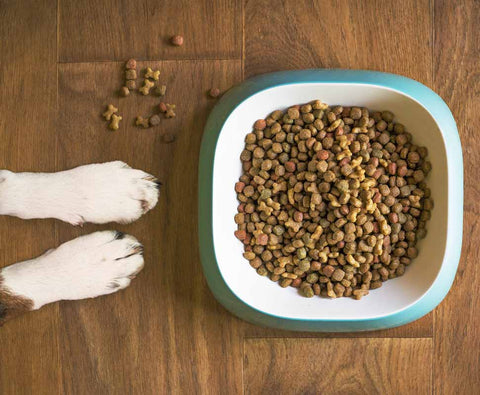

What to Feed | Foods to Avoid | Nutrients | Recommended Supplements
Let food be thy medicine—and your dog’s, too. Cushing’s disease in dogs can be a scary thing to deal with as an owner and as a dog; but luckily, a dog’s food has the ability to heal its Cushing’s disease symptoms over the course of their life. Since there is no cure, treatment must represent a holistic lifestyle change in order for a dog with Cushing’s to live symptom-free. The proper Cushing's diet for dogs must be accompanied by specific herbs that have been found to relieve the symptoms of Cushing’s disease in canines.
Symptoms of Canine Cushing's Disease
Common symptoms include excessive thirst and urination, increased appetite and panting, sluggishness, frequent skin infections, loss of fur, and an enlarged abdomen.
What to Feed a Dog With Cushing's Disease
According to PetMD, a dog with Cushing’s disease should eat a diet low in fat since their high cortisol levels elevate their cholesterol and triglycerides. A moderate amount of fiber and a good amount of highly digestible protein are also important for balancing out the effects of the disease. Depending on which of the two types of Cushing’s disease your dog has, you should consult your veterinarian for the proper diet in relation to sodium. The vet can check for any abnormalities in blood pressure that may require a modification to their diet.
Balance is Key for a Cushing Disease Dog Diet
When diet balances the strain that Cushing’s disease puts on the dog’s body, the next priority is to heal symptoms that can lead to other conditions as they age. In order to achieve this, a dog’s diet must support their adrenal glands, pituitary gland, hypothalamus, liver, kidneys, skin, fur, digestive tract, and immune system.
Adrenal imbalance is at the heart of Cushing’s disease and in order for the adrenal glands to restore themselves, a dog must have plenty of vitamin C and B5 in their diet.
Food for Dogs With Cushing's Disease
The perfect, highly nutritional food for this is dandelion root. Dandelion root contains an array of minerals such as phosphorus and iron that regulate healthy adrenal gland function and promote kidney, liver, and digestive tract health—all the while encouraging the growth of skin and fur.
What Foods to Avoid With Cushing's Disease Dog
Foods dogs should avoid with Cushing's include certain foods that may exacerbate the condition or interact with medications. Here are some foods to avoid:
-
High-Fat Foods: Dogs with Cushing's disease may already be prone to weight gain and fat accumulation. Feeding high-fat foods can further contribute to weight gain and potentially worsen the symptoms associated with the disease.
-
Sugary Treats: Excessive sugar consumption can affect blood sugar levels, which may already be elevated in dogs with Cushing's disease due to hormonal imbalances. Avoid sugary treats or foods that contain added sugars.
-
Processed Foods: Highly processed commercial dog foods often contain artificial preservatives, fillers, and additives that may not be beneficial for dogs with Cushing's disease. Opt for high-quality, whole-food-based diets instead.
-
High-Sodium Foods: Cushing's disease can lead to increased water consumption and urinary output. High-sodium foods can exacerbate these symptoms and may contribute to increased thirst and fluid retention.
-
Medication Interactions: Some foods, particularly those high in fat, can interfere with the absorption of certain medications used to manage Cushing's disease, such as trilostane or mitotane. It's important to follow your veterinarian's recommendations regarding feeding instructions and medication administration.
articleproducts1
Important Nutrients and Minerals for Cushing's in Dogs
Another major factor in healing the symptoms of Cushing’s disease is supporting the nervous system, which requires a wide variety of minerals, including magnesium and manganese. Horsetail is an herb that contains all that and more—even serving to balance hormones in the process. When taken as food, it also helps to relieve the water retention and inflammation caused by Cushing’s disease and maintains the health of the dog’s digestive system. It contains silica and sulphur to aid in the formation of healthy skin, fur, and connective tissues.
When a dog has Cushing’s, the kidneys also need to be supported since the system can become overwhelmed as a result of the disease. Cleavers is an herb that helps the dog’s kidneys expel extra water, which ultimately benefits the adrenal glands and relieves the pot belly caused by Cushing’s disease. It also supports the health of the dog’s mucous membranes with its many vitamins, minerals, and nutrients. Burdock root is another highly nutritious and purifying food. It nourishes the dog’s liver by helping to filter the blood as it is often overwhelmed by the effects of Cushing’s disease. It also treats skin irritation and restores skin thickness and texture in dogs with Cushing’s disease.
As with any food or remedy, the right methods and amounts of these super herbs must be observed for optimal healing of Cushing’s disease symptoms in dogs. Because of this, Prana Pets has created a formula of carefully selected herbs approved by veterinarians called Prana Pets Adrenal Support. It contains the correct measurement of the super herbs known to revitalize a dog living with Cushing’s disease—dandelion root, horsetail, cleavers, burdock root, turmeric root, ashwagandha root, panax ginseng root, and astragalus root. These select herbs work together to masterfully heal the symptoms of Cushing’s disease in dogs so that they may live a balanced, energetic, and happy life.
Supporting the Adrenal Glands Through Diet and Supplements
Prana Pets Adrenal Support is often given to dogs that have Cushing’s in conjunction with Prana Pets Cushing’s Support for the Immune System with astounding results. In addition to being wholesome for the dog’s body, the herbs in this formula also support the dog’s immune function. This disease takes a huge toll on the immune system, especially in cases where the dog has been on pharmaceutical drugs for Cushing’s.
Cushing’s Support for the Immune System contains a unique blend of herbs at therapeutic doses, including the highly nutritive alfalfa leaf which regulates the appetite, normalizes digestion, and builds strength. This superfood is filled with mineral content, including magnesium, potassium, phosphorus, iron, silicon, zinc and calcium. Cushing’s Support for the Immune System also contains blessed thistle, mistletoe, echinacea purpurea, sheep sorrel, milk thistle seed, and cat’s claw bark.
All of the herbs in Prana Pets Adrenal Support and Prana Pets Cushing’s Support for the Immune System complement each other to treat Cushing’s disease symptoms in dogs in the most holistic way possible. Prana Pets offers dog owners hope when they are faced with the decision of putting their dog on pharmaceutical medications, with sometimes harsh side effects, after a Cushing’s disease diagnosis. The natural approach is highly effective, beneficial to the dog’s body, and has no side effects; pharmaceutical drugs on the other hand are damaging to a dog’s immune system and may lead to other illnesses.
A dog should not have to suffer any more pain or discomfort while bearing this disease as they age. Even the tests for Cushing’s disease at the veterinarian can be a burden on their bodies. If a dog has not been tested but is suspected to have Cushing’s disease, our options for natural treatment for Cushing's Disease in dogs like Prana Pets Adrenal Support and Prana Pets Melatonin and Lignans for Dogs can still be safely taken as a precaution and serves as a nourishing supplement regardless.
Prana Pets natural remedies bridge the gap between the daily nutritional aspect of healing symptoms and the effective medicine it takes to truly keep symptoms at bay long term. Prana Pets serves to provide dog owners and dogs with peace of mind, so that they may be free of the problems that arise from the use of pharmaceutical drugs for Cushing’s disease.
articlebanners1
References
- Boughton-White, J. (2020, February 3)
5 Things You Should Know Before Buying Turmeric For Dogs - Dorwest - Curley, K., Schaible, L. (2019, June 27)
What's the Vet-Recommended Diet for Canine Cushing's Disease? - Johnson, K. S. (2020)
Health Benefits of Turmeric for Dogs: Cuteness - Cuteness.com - Naturally, T. (2019, May 1)
Story from Terry Naturally: The ways turmeric and curcumin differ might surprise you - USA Today - Purina, N. (2020)
Are there Benefits of Turmeric for Dogs? - Purina - Office of the Commissioner. (2015, October 25)
Treating Cushing's Disease in Dogs - U.S. Food and Drug Administration - Petersen, C. (2020, July 20)
Critical to Dog's Health: Is Your Dog's Magnesium Level Where It Should Be? - Pet Health Pharmacy - Russo, G. (2019, December 12)
Adrenal Fatigue in Dogs and Cats - SUP Creative Group - Scott, D. (2020, April 24)
Dandelion For Dogs - Much More Than A Weed! - Dogs Naturally - Scott, D. (2020, May 14)
Why Dogs Need Turmeric - Dogs Naturally - Tung, B. T., Nham, D. T., Hai, N. T., and Thu, D. K. (2019, February 8)
Curcuma longa, the Polyphenolic Curcumin Compound and Pharmacological Effects on Liver - Dietary Interventions in Liver Disease




